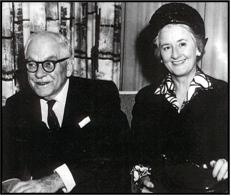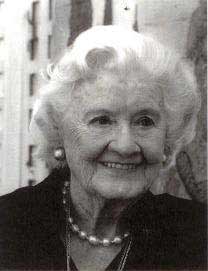Viola, Lady Tait’s zest for life was an inspiration. These qualities remained with her always together with a remarkable memory, clarity of mind and youthful outlook. With a prodigious vocal talent she excelled in the operas of Gilbert & Sullivan, beginning as a chorister with the Carl Rosa Company in the United Kingdom, graduating to the D’Oyly Carte Opera Company, and was given a year’s contract as principal soprano. Accepting a contract to tour Australia in 1940, she was to meet and marry her future husband, Frank Tait.
She was a champion of new and emerging talent, adjudicating for numerous scholarships and awards both in Australia and overseas. As an adjudicator for The Mobil Quest in 1950, Viola was instrumental in launching Joan Sutherland’s career. This passion for supporting young artists continued throughout her life, in 1992 she inspired her daughter, Isla Baring, to organise a fundraising concert in support of a young Australian singer, Liane Keegan, who was newly arrived in London. It kicked off with a Christmas Concert at Australia House. The concert was a great success and became the foundation of our yearly events. Liane went on to have a major international career, she sang Erda in the recent Opera Australia, Ring Cycle.

In 1984, the Performing Arts Collection, housed at the then newly opened Victorian Arts Centre, received a significant donation from Lady Tait of 300 costume designs by leading European theatrical designers of the late Victorian and Edwardian periods. The designs had been imported for use in re-staging productions in Australasia by the commercial theatre management J.C. Williamson Ltd and its forerunners.
Another of her loves was writing and researching Australian theatrical history. She amassed a formidable collection of theatrical memorabilia and was the author of The Family of Brothers (1971), which chronicled the contribution of the Tait brothers to Australian theatre.

Her last book, Dames, Principal Boys and all that: A History of Pantomine in Australia (2001) was lavishly launched at Her Majesty’s Theatre, Melbourne, the home of the Tait-Williamson empire. When Viola’s death was announced the illuminated sign outside the Theatre read “Farewell Lady Tait, Star”.
![]()
Viola Wilson (1938-39)
Source: The Gilbert & Sullivan Archive
[Born Pressburg, Austria-Hungary 1 Nov 1911, died Melbourne, Australia 6 Feb 2002]
Viola Wilson, whose real name was Viola Hogg, studied singing for six years at the Scottish National Academy of Music. In 1935 she was engaged by the Carl Rosa Opera Company and sang in the chorus of Die Fledermaus at the Lyceum Theatre, London. After tours of the British Isles and South Africa, she graduated to principal soprano.
Upon returning to London she auditioned with D’Oyly Carte Opera Company and was given a year’s contract as principal soprano, taking Viola Wilson (her maternal grandfather’s name) as her stage name at Rupert D’Oyly Carte’s suggestion. From May 1938 to June 1939 she appeared with the Company as Patience in Patience, Phyllis in Iolanthe, Yum-Yum in The Mikado, and Gianetta in The Gondoliers. Three of these parts were shared with other artists at various times: Patience and Phyllis with Ann Drummond-Grant until December 1938, and Gianetta with Helen Roberts. Miss Wilson also appeared on occasion in 1938-39 as Rose Maybud in Ruddigore and Elsie Maynard in The Yeomen of the Guard. She left the D’Oyly Carte in June 1939.
Viola Wilson then accepted an offer from Nevin Tait, J. C. Williamson’s London director to tour Australia and New Zealand in the Gilbert & Sullivan operas. In the 1940-42 Williamson tour she appeared as Aline in The Sorcerer, Josephine in H.M.S. Pinafore, Mabel in The Pirates of Penzance, Casilda in The Gondoliers, Princess Ida in Princess Ida, Rose, Patience, Phyllis, and Elsie. While in Australia, she met and married Frank Tait, later Sir Frank, the youngest of the five Tait brothers who were then running the Williamson Company. She retired as a singer in 1946 but remained involved with the Williamson Company, serving for a time as an artistic director.
![Viola Wilson in character as Elsie in Gilbert and Sullivan's The yeoman of the guard, 1940?] [picture] / S.J. Hood](https://taitmemorialtrust.files.wordpress.com/2016/12/nla-obj-148735416-1.jpg?w=217)
Following Sir Frank Tait’s death in 1965, Lady Viola Tait, as she was then known, wrote an informal history of the Williamson-Tait partnership. In “A Family of Brothers: The Taits and J. C. Williamson; a Theatre History” (William Heinemann, Melbourne, 1971) she also provides a good deal of information about her own life and career.
Lady Tait retained her interest in the performing arts thoughout her life and was a patron of many arts organizations, including the Tait Memorial Trust. She was instrumental in the establishment of the Performing Arts Museum in Melbourne, and was appointed a member of the Order of Australia (AM) in 1990. In her later years she published a book on the history of pantomime in Australia, “Dames, Principal Boys…and All That” (Macmillan, Melbourne, 2001)
Source: Viola Wilson


